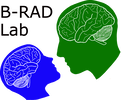Author: Danielle RaynorFor our weekly Inclusion in Neuroscience discussion, our lab members read the article “Do Different Kinds of Minds Need Different Kinds of Services? Qualitative Results from a Mixed-Method Survey of Service Preferences in Autistic Adults and Parents” written by Ariel M Cascio and Eric Racine. From this article, we learned that there are more inclusive and considerate ways to provide accommodations for the autistic community, such as advocating for services with multiple divisions that support each person’s specific needs. Additionally, we watched a video titled “Autism Service Dog Feature: Olivia's Story” that discussed a child's journey and how her service dog has helped her. This video describing Olivia’s story demonstrated that creating individualized services to accommodate an individual's needs can make a positive impact in their life.
In the lab’s group discussion, we emphasized that we should not generalize service preferences in participants, especially in autistic individuals. While some participants prefer “autism-specific services”, most participants in the study reported a preference for different services that cater to their own needs. As researchers, we cannot overgeneralize service preferences because autism is heterogeneous, and there is a wide spectrum of preferences. Neurodiverse individuals are vastly different, which is why our lab believes in understanding each person as an independent, unique individual and listening to their preferences and experiences. We also discussed how having services available in different environments is one of the most important aspects of service delivery, but this is currently an issue for many families. Availability of services for parents and their child varies based on geographic location and transportation. For example, the number of service options in many geographic locations do not match the density of autistic individuals in that same area needing services, which can lead to funding issues. Keeping possible roadblocks like this in mind, our lab has learned that we need to consider where the participants we work with are located and create plans for addressing these barriers. Lastly, we learned that although it is essential to consider and respect the needs of parents, we cannot gain true insight into the needs of autistic individuals just from parents' perspectives. It is crucial to also listen to autistic individuals. We want to support the autistic community by respecting their preferences and needs through individually focused services. We believe this is important in research and for working towards an inclusive society.
0 Comments
Your comment will be posted after it is approved.
Leave a Reply. |
AuthorB-RAD Lab Members all contribute articles Archives
January 2024
Categories
All
|
|
Copyright: B-RAD Lab, Dr. Caitlin Hudac
|
Sitemap | Contact
|
Website updated: June 2024
|

 RSS Feed
RSS Feed